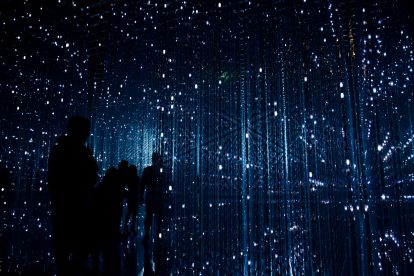

As physical distancing makes the thought of a cold pint in a bustling beer garden feel like the last comforting memory of an astronaut drifting further into space, technology provides a lifeline – moving from a familiar way to connect to an essential way to stave off isolation and loneliness.
Technology has been a driving force of cultural change over the past 30 years but as Covid-19 has brought a radical interruption to the global landscape, our use of technology is reframing its place and importance in all our lives.
Beyond proving that many jobs can be successfully done from our sofas and revealing the yawning void between the self-isolation experiences of celebrities and their followers, this period of enforced experimentation is impacting the way we use and consider technology in real time.
Ground-up Repurposing
People are flocking to platforms that allow them to continue their modes of connection as before (at the time of writing Zoom is at the top of most mobile app stores and gaming chat platform Discord has upped the maximum capacity for a single chat 5 fold). As they do so, they’re discovering that functionality, look and feel, and content are not reflective of the experiences and connections they need in a lockdown world. This is leading to a ground-up repurposing of technology: Zoom is hosting family gatherings while Tinder became a way to circumvent government restrictions and get news on the Coronavirus situation in China.
People are ingenious and are claiming digital spaces for the purposes they need, not just what they were intended for. Increasingly malleable and customisable platforms are likely to become the new normal, while agile tech companies will be able to re-skin or sub-brand their platforms to fit specific use cases.
Playful Performativity
Doubling down on our digital connections means we’re all experiencing Warhol’s fleeting fame through a 21st century lens. We might not be famous per se, but we are appearing on the small screen at a rate that would make influencers desperate for affiliate-link revenue blush. Beyond transforming the platforms we use to connect, we are transforming the way we appear on screen: whether that’s a surreal background overlay on video chat, appearing as a mythical creature through filters, or simply wearing above-the-neck fancy dress. Stripped of the subtle physical cues that provide levity and connection in everyday life, we are moving towards sillier and more spirited representations of ourselves, moving away from the flattened, desaturated version of us that’s typically mirrored back to us on screen.
Unlocking the archetypical jester in all of us is an excellent coping strategy, but also speaks to a new normal where a truly sideways, provocative view of the world is welcomed and more common. Suddenly, we have permission to paint the walls with our dreams.
Navigating the Challenges of Community
One of the truisms of Web 2.0 is that it not only allowed us to project a curated identity to the world, but to choose the community to which we projected that sculpted ‘me’. However, the immediate and tangible concerns of Covid-19 have reinvigorated the importance of local community, often mediated by technology. WhatsApp groups have sprung up at the scale of a street or neighbourhood to care for those at risk, and to swap stories and tips on getting by in this odd and potentially lonely time.
When the community becomes geographic again, it’s not possible to screen out people who share different views to you. A new normal might mean straightforward messaging technology continuing to facilitate connection with those around us in a way that breaks down echo chambers and information silos – achieving something that algorithms never could.
Each of these examples points to a new relationship with technology that’s more human, malleable, and playful. Digital etiquette is shifting to accommodate an influx of users, presenting a big opportunity for technology to read the human response and make hacks feel like intended uses, and an opportunity for people to make those digital spaces feel more human and inclusive.
For more like this straight to your inbox, sign up to our newsletter.